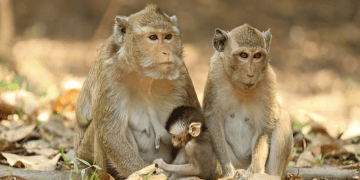The Convention on International Trade in Endangered Species of Wild Fauna and Flora (CITES) has opted to continue permitting Cambodia’s export of long-tailed macaques (Macaca fascicularis) until at least November 2025. This decision follows recommendations for suspension due to concerns over potential poaching and the misrepresentation of wild-caught monkeys as captive-bred.
During the recent CITES Standing Committee meeting in Geneva on February 4, 2025, member countries, including Japan, China, Canada, and the United States, opposed the proposed suspension. These nations emphasized the need for further review and discussion, expressing varying degrees of confidence in Cambodia’s compliance with CITES regulations. Some delegates highlighted the importance of the macaque trade to their respective research industries.
Japan’s representative, speaking on behalf of Asia, stated that the recommendation for suspension was not aligned with CITES procedures, noting a lack of sufficient discussion and decisions by the CITES Animals Committee. Similarly, China’s delegate deemed it premature to single out Cambodia with a trade suspension at this time.
Canada’s representative acknowledged the country’s importation of Cambodian macaques for research purposes, noting that each import is verified and that there is confidence in the animals being captive-bred. However, they also recognized the need for further examination of breeding numbers and related issues before establishing any trade suspension.
Cambodian officials strongly objected to the proposed suspension, disputing claims about unrealistic birth rates at breeding facilities. Chheang Dany, deputy director of Cambodia’s Forestry Administration, asserted that Cambodia had already provided clarification on these data points. He also raised concerns about the use of data obtained without Cambodia’s consent during investigations into alleged monkey laundering.
Despite these objections, conservation groups have expressed disappointment with CITES’ decision to delay the suspension. They highlight ongoing threats to wild macaque populations, including poaching, habitat loss, and zoonotic risks. These organizations warn that the decision enables potentially unsustainable trade practices amid mounting evidence of misconduct.
The CITES Standing Committee has resolved to keep the trade of Cambodian long-tailed macaques under review until the CITES Conference of the Parties (COP20), scheduled for November 24 to December 5, 2025, in Uzbekistan. At that time, Cambodia’s trade status will be reassessed.
The international trade of long-tailed macaques is a significant concern, with the species recently classified as endangered due to factors such as habitat loss and overexploitation. The ongoing debate within CITES reflects the complex balance between conservation efforts and the interests of scientific research communities that rely on these animals.
As the situation develops, stakeholders from conservation groups, research institutions, and governmental bodies will continue to monitor and influence the policies governing the trade of long-tailed macaques to ensure both the protection of the species and the ethical considerations of their use in research.
Discover comprehensive supply chain report news insights at The Supply Chain Report. For international trade resources, visit ADAMftd.com.
#CITESCambodiaMacaqueTrade #EndangeredSpeciesProtection #WildlifeConservationDebate #SustainableMacaqueTrade #CambodiaMacaqueExport #CITESGenevaMeeting #MacaqueConservationCrisis #GlobalWildlifeRegulations #ResearchVsConservation #MacaqueTradeReview















